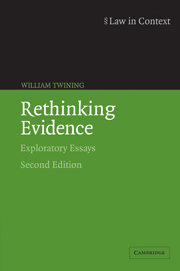Book contents
- Frontmatter
- Contents
- Preface
- Acknowledgements
- List of abbreviations
- Table of cases
- 1 Introduction: the story of a project
- 2 Taking facts seriously
- 3 The Rationalist Tradition of evidence scholarship
- 4 Some scepticism about some scepticisms
- 5 Identification and misidentification in legal processes: redefining the problem
- 6 What is the law of evidence?
- 7 Rethinking Evidence
- 8 Legal reasoning and argumentation
- 9 Stories and argument
- 10 Lawyers' stories
- 11 Narrative and generalizations in argumentation about questions of fact
- 12 Reconstructing the truth about Edith Thompson the Shakespearean and the jurist
- 13 The Ratio Decidendi of the Parable of the Prodigal Son
- 14 Taking facts seriously – again
- 15 Evidence as a multi-disciplinary subject
- Bibliography
- Index
10 - Lawyers' stories
Published online by Cambridge University Press: 15 December 2009
- Frontmatter
- Contents
- Preface
- Acknowledgements
- List of abbreviations
- Table of cases
- 1 Introduction: the story of a project
- 2 Taking facts seriously
- 3 The Rationalist Tradition of evidence scholarship
- 4 Some scepticism about some scepticisms
- 5 Identification and misidentification in legal processes: redefining the problem
- 6 What is the law of evidence?
- 7 Rethinking Evidence
- 8 Legal reasoning and argumentation
- 9 Stories and argument
- 10 Lawyers' stories
- 11 Narrative and generalizations in argumentation about questions of fact
- 12 Reconstructing the truth about Edith Thompson the Shakespearean and the jurist
- 13 The Ratio Decidendi of the Parable of the Prodigal Son
- 14 Taking facts seriously – again
- 15 Evidence as a multi-disciplinary subject
- Bibliography
- Index
Summary
I understand that his strength as an advocate lay not in his powers of oratory, but in the reasoning and persuasiveness of the arguments by which he tried to bring the court round to his point of view. He continued to use his powers of persuasion when he was sitting as a Lord of Appeal and would come home and say that he thought that he had won his ‘brothers’ over to his side or ‘so-and-so is still not convinced but I think he may be tomorrow.’ He certainly persuaded his family that he was right. When he gave us the facts of a case and asked us what we thought about it, his way of presenting the problem was such that there was never any suggestion in our minds that the other side could have a leg to stand on.
E. Cockburn Millar on her father, Lord AtkinMight it be suggested that the central act of the legal mind, of judge and lawyer alike, is the conversion of the raw material of life … into a story that will claim to tell the truth in legal terms?
James Boyd WhiteIntroduction
Once upon a time, Rhetoric was central to the humanities and forensic oratory was central to Rhetoric. In the long and complex story of rhetorical studies, the forum ceased over time to be the main arena and persuasive oratory was displaced as the main object of study.
- Type
- Chapter
- Information
- Rethinking EvidenceExploratory Essays, pp. 286 - 331Publisher: Cambridge University PressPrint publication year: 2006

